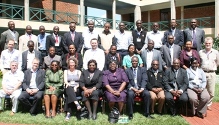Breaking the Poverty Cycle

The workshop participants
21 November 2012
Several months ago Institute of Biological, Environmental and Rural Sciences submitted a bid to the BBSRC (along with its partners: Africa Harvest, the Kenyan Agricultural Research Institute (KARI) and Africa College, Leeds) to fund a workshop focussed on sorghum development for East Africa. The bid was successful and the workshop was held in Nairobi on the 6th and 7th November 2012.
Sorghum is an African domesticate and a highly drought tolerant crop, well suited to growing in some of the world’s driest and therefore often poorest areas. Furthermore, sorghum is extremely versatile. In a spectrum of smallholder situations its grain is used both as food and animal feed. In addition, surplus grain can increase income when used in the brewing industry. The remaining stover provides a source of fodder and fibre and has potential to be used as a biofuel feedstock. Whilst historically maize has replaced sorghum in many African smallholder systems, its range is increasingly limited by climate change. Where this occurs sorghum provides one of the few viable alternatives.
The workshop focussed on collating existing knowledge concerning the development of sorghum as a multifunctional crop. It was attended by delegates from ICRISAT, Sokoine University, Makerere University, Moi University and the University of Nairobi. It was also attended by seed companies, farmers and animal feed producers. IBERS was represented by: Prof Noel Ellis, Prof Chris Thomas, Dr Michael Lee, Dr Maurice Bosch and Marty Spittle.
A key outcome of the two days was identifying the need to pool resources to focus on developing the traits which give most benefits to the smallholder. There was an overwhelming feeling that using sorghum as a means to feed livestock when grazing was scarce would be key to enhancing food security in areas of sub-Saharan Africa most affected by climate change. This would also allow land less favoured for other purposes, to be used and may mitigate the need for further exploitation of natural areas.
The ability to use the grain as human food and the rest of the plant as fodder has great potential to enhance smallholder nutrition both directly and in terms of meat and milk production. Interestingly, the traits which improve digestibility of the leaves and stalks for ruminants also make them more viable as a bioenergy source. This potential for dual (or multiple) use gives farmers an option to use surpluses as a cash crop. Meanwhile, whilst the animal feed sector is well established in much of East Africa, the bulk of feed produced currently uses imported grains or maize, which is better suited to human food. Feed producers would welcome reliable supplies of sorghum grain as a means to develop domestic feed security.
The partners are now developing research concept notes which aim to pool their existing knowledge in matching genotypes to desired traits for smallholder end use. They will use this information to match crops to suitable growing conditions, taking account of climate change projections. Crop improvement and breeding work and the development of an electronic seed-bank will be carried out by ICRISAT, IBERS and KARI. Africa Harvest will engage with sorghum end users and the associated value chain to ensure that the project has a well developed impact path.
Meanwhile, Africa College, Leeds will be responsible for threading an ecosystems services approach throughout the work.



